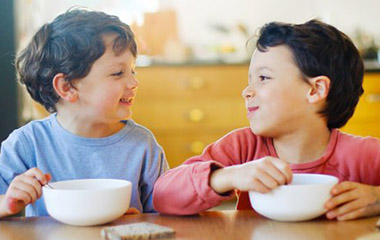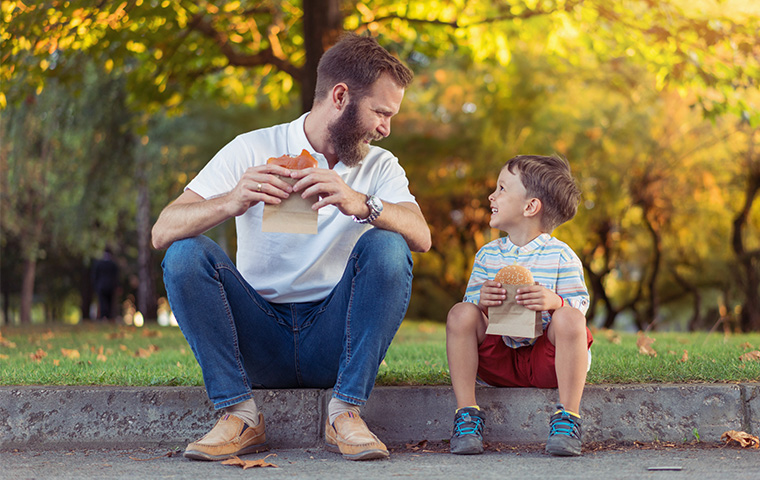8 Ways to Help Kids Deal with Life Changes
By GetParentingTips.com staff
Read Time: 9 Minutes
Life changes can be hard for anyone, especially kids. Children do well with structure and stability, so changes that affect regular routines can have a big effect on their emotions. Negative life changes such as divorce, a family move, or the death of a loved one can cause big feelings. Positive life changes can also cause worries. Going to a new school, getting a new sibling, or having a parent return home from military duty can be exciting—and scary.
Life changes aren’t always big events. They also include common life transitions as a child grows up. These include starting kindergarten, moving to the next grade, entering puberty, or graduating from high school. This article covers the expected and unexpected changes that families often face.
Life Changes Can Cause Behavior Changes
Every child is different, and kids react to life changes in different ways. Some children take everything in stride, while others may feel anxiety and stress. How your child reacts to change will depend on her (or his) personality. It’s common for your child to feel:
- Sad.
- Anxious.
- Afraid.
- Angry.
- Moody.
- Isolated.
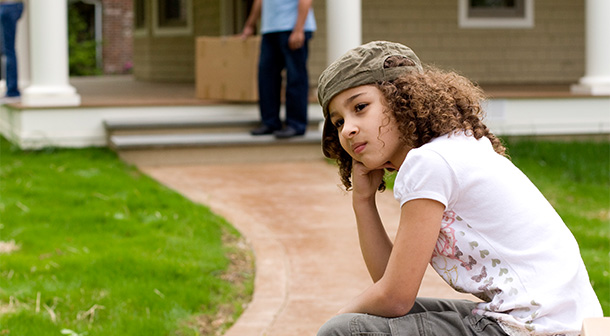
First, How Are You Feeling?
The life change affecting your child may also affect you or even the whole family. Understanding and dealing with your own feelings is the first step in being able to help your child. Think about your feelings. Does the change make you feel nervous, excited, scared, or anxious? If so, talk to a trusted friend or family member to help sort out your feelings. If the situation is too much for you to handle, consider talking to a counselor or therapist. Once you have control of your own emotions, you can help your child deal with her feelings.
Honor Your Child’s Big Feelings
Start by showing you’re aware that a life change has made a big impact on your child. Let her know that her feelings are normal and that life changes can be hard for everyone. Sharing your feelings with your child might be helpful, but don’t vent or make her feel like she needs to comfort you. That could make things worse for her.
Set aside a time to ask your child how she’s feeling. Listen and ask follow-up questions to help her name her feelings and begin to understand them. By helping her work through her fears and worries, you can help her find a sense of security and comfort.

When Small Changes Feel Big
Sometimes, a change that upsets your child might seem small to you. Adults have experience dealing with life transitions. You’ve been doing this for years, and you’re better able to handle life changes. When your child gets a new teacher, has a fight with a friend, or doesn’t make a team, she might feel sad or angry. Let her know that it is okay to be upset and encourage her to talk about them.
8 Ways to Help Your Child Deal with Life Changes
These steps will help your child deal with life transitions.
Prepare ahead of time.
When you know a life transition is coming, tell your child in advance. Help her understand what to expect and how things may look different. Share how you felt about a similar life change. If you’re moving to a new place or it’s time to change schools, take your child for a visit ahead of time. If a friend is moving away, help her make a goodbye card or buy a gift. When expecting a new baby, talk about what it’s like to be a big sister and remind her that your love for her will be the same.
Keep daily routines.
Regular routines give kids a sense of security and comfort. They are even more important during life transitions. Try to stick with family routines such as a set mealtime, playtime, bath time, and bedtime. These routines give a feeling of normalcy that helps offset the stress of life changes.
Protect your child's physical health.
Stress takes a toll on the body, so do what you can to keep your child healthy during life changes. Make sure she drinks lots of water and eats healthy meals. Try to get daily physical activity as a family. You could go for a walk after dinner, have a push-up contest, or dance together in the living room. Have fun! But be sure everyone gets to bed on time so they can get enough sleep. Eating healthy, being active, and a good night’s sleep are key for your child’s health. And, being healthy is even more important during stressful times.
Experts recommend 9–12 hours of sleep per night for school-age children. Younger kids need even more sleep!
Protect your child’s mental health.
Stress can also affect mental health. During life transitions, help your child find coping skills that suit her. You can even practice them together! Try things such as:
- Breathing slowly and deeply.
- Going for a walk.
- Listening to music.
- Talking with a family member or friend.
- Writing or drawing in a journal.
Find (or make) a support group.
When your child is going through life transitions, reach out to family and friends for support. Talk to your child’s teacher, coach, or parents of your child’s friends to make them aware of the difficulties she’s facing. They can give her, and you, extra support. Let your child know you have talked to these other grownups and that she can talk to them, too.
Need parenting help now?
The Texas Parent Helpline is available 24/7.
- Call 833-680-0611
- Chat with us
- Text 833-680-0611
Give kids choices when you can.
Giving kids some control during life changes can help them feel included and understood. Little things can make a big difference. If you’re moving to a new house, let your child pick the bedding for her room. If she’s moving to a new school, let her pick out a new outfit or backpack.
Be there for your child.
Now more than ever, make sure you are there for your child when she’s dealing with life transitions. Try to find moments in your day to just be together. You might share breakfast in the morning, chat on the ride to school, make dinner together, or read before bed. This time together is a great time to talk or just be together.
Limit changes when you can.
Try to limit how many life changes your child must face at once. Give her time to deal with the first life transition before she faces another big change.
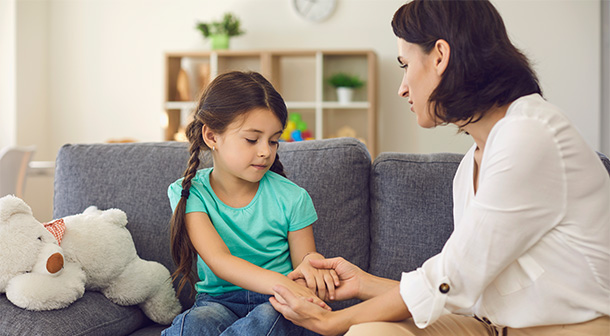
Planning for Your Child’s Life Changes
A life change might call for a special plan. Follow these tips to help ease a few common life transitions, some big and some small.
Starting kindergarten
Most children begin kindergarten when they are 5 years old, and it’s a big life change! Many kids are excited about starting kindergarten, while others may be fearful. The good news is there are several things you can do to help calm your child’s worries.
- Talk about kindergarten ahead of time and tell her what to expect.
- Check out library books about what happens in kindergarten and read them together
- Get together with other families who have children the same age. Plan a playdate before the first day so your child can meet new kids.
- Visit the kindergarten with your child and find places she’ll be at school, such as the lunchroom and restroom.
- Go shopping together to pick out school supplies.
- Pick out a special outfit for the first day.
- Set daily school routines.
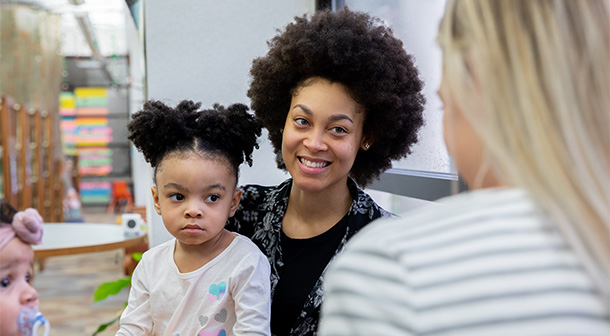
Having a first sleep-over
Many kids have their first sleep-over when they’re 7 to 9 years old. It can bring both excitement and worry.
- If you don’t already know the other child’s parents, talk with them ahead of time and let them know it’s your child’s first sleepover.
- Tell the other parents about your child’s usual bedtime and any special routines, such as reading a book or singing a song. This can make her feel more comfortable sleeping in a different place.
- Help pack her overnight bag with things like pajamas, a toothbrush, fresh clothes, a pillow, and a favorite toy or blanket.
- Let her know she can call you to come get her if she changes her mind and wants to go home.
When a best friend moves away
Your child may be heartbroken when a close friend moves away. It’s especially hard if it’s the first time she experiences loss or separation.
- Talk about the move ahead of time and make plans for the friends to stay in touch.
- If the friend is moving across town, schedule monthly weekend visits if possible.
- If the move is farther, suggest they set times for video calls or writing letters.
- Hold a gift exchange. They could give each other a favorite toy from their playtimes.
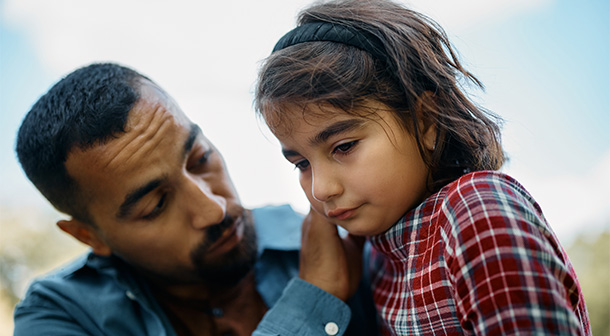
When parents split up
Separation and divorce are difficult life transitions for the whole family. Children do best when both parents are caring and involved in their lives. Parents who set aside their differences to co-parent calmly and safely make this huge change smoother for children.
- Listen to your child, check in with her often, and ask how she’s feeling. Give her emotional support and make sure she knows the separation or divorce was not her fault.
- Parents should have the same rules and expectations at both households. For example, activities allowed at one house should be the same at the other one. This avoids stress for the child and the parents.
- Consistent routines give kids stability. Parents should set similar bedtimes and have the same homework routines.
- If you have a disagreement with your ex, work it out in private. Keep your child out of the conflict.
Listening can have a big effect on your child’s mood. If she is mad, sad, scared, or having other big feelings, let her talk it out. Put down your phone, make eye contact, and let her know you hear her.
When a single parent finds a new partner
The parent and child in single-parent households often form a strong bond. A new partner may strain this bond. Your child may view your new partner as a threat. She may fear she won’t be as important to you or think she won’t be able to spend as much time with you.
- When a romantic relationship becomes serious, tell your child. Give her a chance to share her feelings and reactions with you before she meets your new partner.
- If you are co-parenting, talk to your ex before introducing your new partner so he (or she) can help support your child during this life change.
- Make sure you and your child still have lots of one-on-one time together without the new partner present.
- Keep up family traditions and routines. If you and your child always have a special Tuesday night dinner, don’t miss it or change plans without talking first.
- If you are going to combine households, plan ahead. Talk about everyone’s needs and wants.
- Think about what role your new partner will play in raising your child. Will he or she play a part in setting rules and expectations? Make sure everyone agrees on roles before you decide to move in together.
- Look for ways to find common ground. Find activities that your whole family can enjoy, such as riding bikes, going to the library, taking a hike, playing games, or watching sports.
- Talk about how hard these kinds of changes can be. This big change is new for everybody! Know that your family, including your child and your new partner, will have to work together to find routines that will work for everyone.
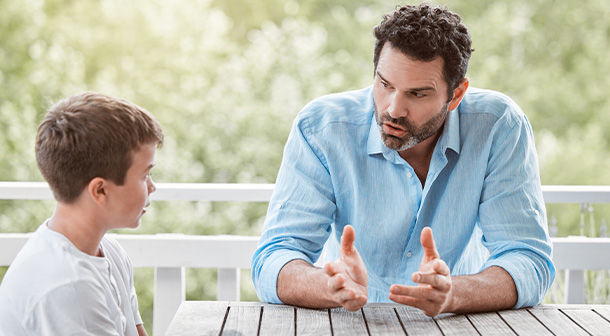
Learning to Bounce Back
Many life changes can be extremely painful, but they give children a chance to learn about the different events life brings and understand their feelings about them. Resilience is the ability to get through and recover from difficulties. It is one of the most important skills a child can learn. You are key to helping your child become resilient and prepare for future challenges. Tackling these big life transitions together will help her learn ways to manage life changes again and again.


